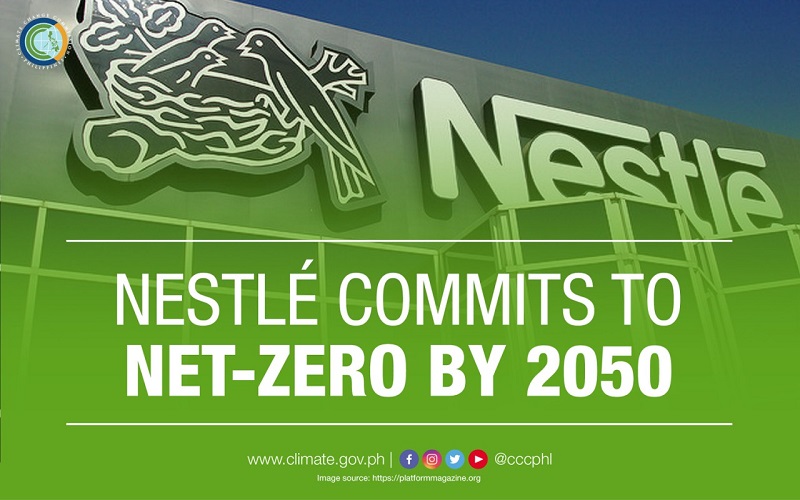
May 02, 2021 Sunday

MANILA, 3 May 2021 — The Climate Change Commission (CCC) welcomed Nestlé Philippines’ commitments to halving their greenhouse gas (GHG) emissions by 2030 and achieving net zero by 2050 – even as the business continues to grow. This was during the 2021 Net-Zero Fair: Nestlé’s Contract with the Planet event virtually held April 30. Nestlé, among the world's top food and beverage manufacturers, declared 92 million tonnes of GHG emissions in 2018 - more than half of which came from the process of sourcing the ingredients for their products.
“From now until 2025, we will accelerate and expand the work already undertaken to achieve a 20% reduction in emissions. Between 2025 and 2030, we will transform our operations to achieve a 50% reduction of emissions. Finally, from 2030 to 2050, we will work to balance our emissions by exploring how we offset any remaining emissions through high-quality carbon removal projects or innovation, the result of which will be net-zero emissions,” Nestlé declared in its Net Zero Roadmap.
To achieve these milestones, Nestlé pledged to take action across agriculture, operations and products, including:
·Protecting trees and landscapes that help absorb carbon and planting 20 million trees every year for the next 10 years;
·Working with farmers to shift to regenerative ways of growing ingredients for food, including for the products produced;
·Ending deforestation in the primary supply chains by 2022;
·Completing the transition to 100% renewable electricity in the 187 countries operated by 2025; and
·Increasing the number of 'carbon neutral' brands to give consumers the opportunity to contribute to the fight against climate change.
CCC Secretary Emmanuel M. de Guzman noted that the company's commitment to shift towards carbon neutrality aligns with the country's objectives in its first Nationally Determined Contribution under the Paris Agreement on Climate Change.
The first Philippine NDC conveys an ambitious emissions reduction target of 75 percent from 2021 to 2030 compared to business-as-usual projections. It formalizes the country’s goal of pursuing a low carbon and resilient development for the agriculture, waste, industry, transport, and energy sectors over the decade.
"The role of business and industry in the climate agenda is critical. It stands with many others that hold significant resources and capacity for investment. If harnessed properly, these could drive innovation, create more opportunities, and improve millions of lives,” De Guzman said.
The CCC encouraged Nestlé and other businesses to responsibly and efficiently utilize principles of the circular economy through more efficient recycling, sustainable packaging, and reducing their carbon footprint. The company's fast moving consumer goods have been tagged in the 2020 Brand Audit Report of the Break Free From Plastic coalition as one of the world’s top plastic sources of marine litter.
The climate body is actively advocating for the passage of a law that would phase out single-use plastic products across the country according to set periods depending on the products' replaceability or recyclability. The phaseout will be complemented by the establishment of an extended producers responsibility (EPR) scheme to oblige companies to take-back, collect, and recycle their products and help reduce waste going into landfills or leaking into the natural environment.
“Government and individual actions are vital to addressing climate change. That we are increasingly being joined by partners in the large business sector is a positive and encouraging step forward. Nestlé Philippines is taking full responsibility for its climate footprint; we hope that initiatives like today’s inspire more private businesses to undertake bolder climate action, as we all work together to sustain the momentum and the gains for a safer and more secure future for all,” said de Guzman.